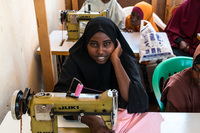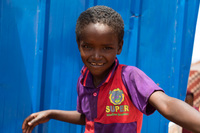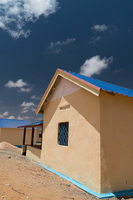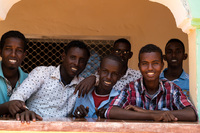In 2013 the United Nations, along with the Somali and Kenyan Governments, signed the Tripartite Agreement to repatriate Somalis who had lived in Kenya’s Dadaab Refugee Camp since 1991, when the civil war began. Camp residents were incentivized to return to Somalia, but most had left the country as young children or were born in the camp and had never been to Somalia. Since the agreement, 93,000 people have returned to Somalia, with most returnees settling in the port city of Kismayo. Those who returned were faced with limited livelihood opportunities, continued conflict, and the effects of climate change.
Alight has spent a decade working in Kismayo. We have constructed water facilities, established fishing cooperatives and built a fish market. Our many projects in the area have been centered around the interests of our clients— from the rehabilitation of the Waamo Football Stadium, to launching a microfinance institution to provide loans for women and youth wanting to launch businesses. We have fostered deep connections that have served as the foundation for us to do deeply impactful work. We run several health facilities in Kismayo and have invested in primary and secondary education, vocational training, and youth programs.

When the Government of Somalia and the United Nations sponsored a new settlement in Kismayo to address the influx of people returning from Kenya, we saw the potential to create something outside of the norm – to help build a community that could uplift and empower residents, while focusing on sustainability. Somalis are particularly vulnerable to climate change, as many are nomadic pastoralists who rely on their animals (mostly camels, goats, and sheep). Climate change continues to have devastating impacts on their livelihoods, causing droughts, floods, and crop destruction.
Co-creating with Somali families allowed their collective vision to guide the creation of this new settlement. The residents of the new community chose to name it Midnimo, which translates to “Unity.” They decided on each building and amenity that would best serve them: separate boys and girls schools, a marketplace, a police station and a Maternal and Child Health Center (MCH). The MCH focuses on pregnant women, breastfeeding women, and children under the age of five, as these groups are the most vulnerable to disease. Midnimo also prioritizes a women and children’s safe space that offers counselling and other mental health support, a rarely accessible service in Somalia.

Residents requested traditional housing that would provide privacy and outdoor space. Each home was built on 300m2 and included a small yard for domestic work, such as chicken coops, a space for goats, or a vegetable garden. To supply the community with cost-effective and environmentally friendly power, we partnered with Somalia Stability Fund and Solargen Technologies. They helped us install a solar grid that powers Midnimo with independent solar energy and reducing greenhouse gas emissions. The solar panels are maintained by dedicated residents. Designing and building Midnimo with a focus on sustainability allowed us to look towards the future, prioritizing the long-term well-being of all the residents.
The Midnimo Community in Kismayo is a blueprint for possibility. Alight built 200 homes that met the holistic needs of families. Guided by the residents—Somali returnees and internally displaced families—we created a neighborhood that would best serve the people it was intended for. By building houses designed with their feedback, we made homes they loved. Midnimo has inspired a new housing project called Digaale, which Alight has just begun in Hargeisa, Somaliland. The creation of Digaale is addressing the needs of a newly displaced community of approximately 100,000 people. Through this project, we are taking the lessons learned in Midnimo to help an even greater number of displaced families build a new home.

